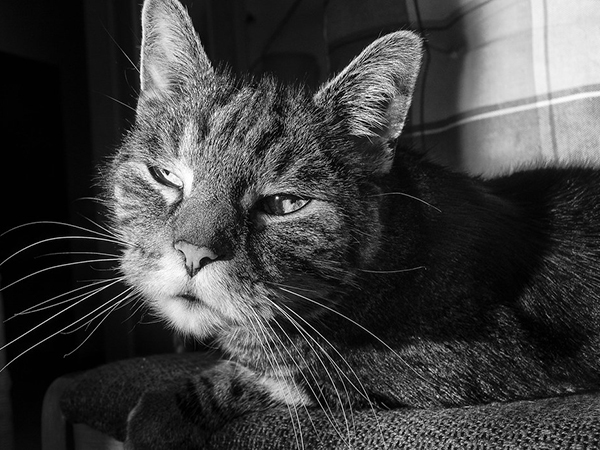The Best Way to Care for an Aging Cat
|
Mar 6, 2024 - By the dedicated team of editors and writers at Newsletter Station.

|
As our feline companions grow older, they require special attention and care to ensure their comfort and well-being. Just like humans, cats undergo physical and behavioral changes as they age. To provide your aging cat with the best quality of life, it's essential to understand their evolving needs and adapt your care routine accordingly.
In this blog, we'll explore the best way to care for an aging cat, covering everything from nutrition and health to comfort and companionship.
- Regular Veterinary Check-ups
Regular veterinary check-ups are one of the most crucial aspects of caring for an aging cat. As cats age, they become more susceptible to various health issues, including arthritis, dental problems, kidney disease, and diabetes. Scheduling regular check-ups with your veterinarian can help catch these issues early, allowing for prompt treatment and better management of your cat's health.
- Tailored Nutrition
Diet plays a pivotal role in maintaining your aging cat's health. Transition your senior cat to a specialized senior cat food that is lower in calories but higher in essential nutrients. These specially formulated diets support joint health, digestion, and overall vitality. Always consult your veterinarian for the best diet for your cat.
- Hydration
As cats age, they may become less inclined to drink water, which can lead to dehydration. Encourage your aging cat to stay hydrated by providing clean, fresh water in easily accessible locations. Some cats may prefer running water from a pet fountain, so consider investing in one to entice them to drink more.
- Dental Care
Oral health is often overlooked in cat care but becomes increasingly important as your cat ages. Dental problems can lead to pain and difficulty eating. Regular dental check-ups and care, such as toothbrushing or dental treats, can help maintain your cat's oral hygiene.
- Comfortable Living Environment
Creating a comfortable living environment is essential for an aging cat. Ensure that their favorite spots are easily accessible, and consider providing soft, supportive bedding for them to rest on. Older cats may appreciate heated cat beds or warm blankets during colder months to soothe any achy joints.
- Exercise and Mental Stimulation
Even as cats age, they need exercise and mental stimulation to stay healthy and happy. Engage your aging cat in playtime with interactive toys encouraging physical activity and mental engagement. Puzzle feeders can also help keep their minds sharp while providing a meal.
- Medication and Supplements
If your aging cat has been diagnosed with a chronic condition, such as arthritis or kidney disease, follow your veterinarian's prescribed medication regimen. Additionally, discuss with your vet whether supplements like joint support or omega-3 fatty acids could benefit your cat's overall health.
- Weight Management
Maintaining a healthy weight is crucial for an aging cat. Obesity can exacerbate age-related health issues, such as arthritis. Consult your veterinarian for guidance on managing your cat's weight through diet and exercise.
- Regular Grooming
Aging cats may have difficulty grooming properly, leading to matting, skin issues, and discomfort. Regular grooming sessions can help keep your cat's coat clean and tangle-free. Brushing also provides an opportunity to check for lumps, bumps, or changes in their skin.
- Emotional Support
Lastly, never underestimate the importance of emotional support for your aging cat. Spend quality time with them, offering affection, gentle petting, and a calm, reassuring presence. Cats thrive on routine and stability, so try to maintain a consistent daily schedule to reduce stress.
Caring for an aging cat is a labor of love that requires attention to detail and a deep understanding of your furry friend's changing needs. By providing regular veterinary care, tailored nutrition, a comfortable environment, and emotional support, you can help ensure that your aging cat enjoys a high quality of life throughout their golden years.
Remember that every cat is unique, so consult with your veterinarian for personalized guidance on caring for your specific aging feline companion.
Unlock the Power of Email Marketing
Harness the potential of email marketing with Newsletter Station. Reach your target audience, drive conversions, and achieve your business goals.
|
More Blogs
| Apr 24, 2024 |
Is Pet Insurance Worth the Cost? Unraveling the Benefits and Considerations
|
| Apr 17, 2024 |
Making a Move Easier for Your Dog or Cat
|
| Apr 10, 2024 |
Helping Your Family Grieve After Losing a Pet
|
| Apr 3, 2024 |
Why Enrichment is Important for Your Pet
|
| Mar 26, 2024 |
How to Successfully Foster a Cat or Dog: A Guide to Making a Positive Impact
|
| Mar 20, 2024 |
How Often to Bathe Your Dog: A Guide to Keeping Your Furry Friend Clean and Healthy
|
| Mar 13, 2024 |
How to Prepare Your Home for a New Dog
|
| Mar 6, 2024 |
The Best Way to Care for an Aging Cat
|
| Feb 28, 2024 |
Introducing Your Baby to a Dog or Cat: Building Loving Bonds
|
| Feb 21, 2024 |
Tips for Cutting Your Dog's Nails
|
| Feb 14, 2024 |
The Best Places to Put a Cat’s Litter Box
|
| Feb 7, 2024 |
How Much Exercise Does Your Pet Need?
|
|
|
|